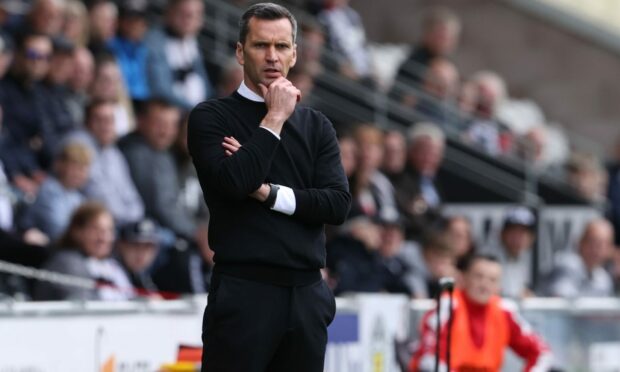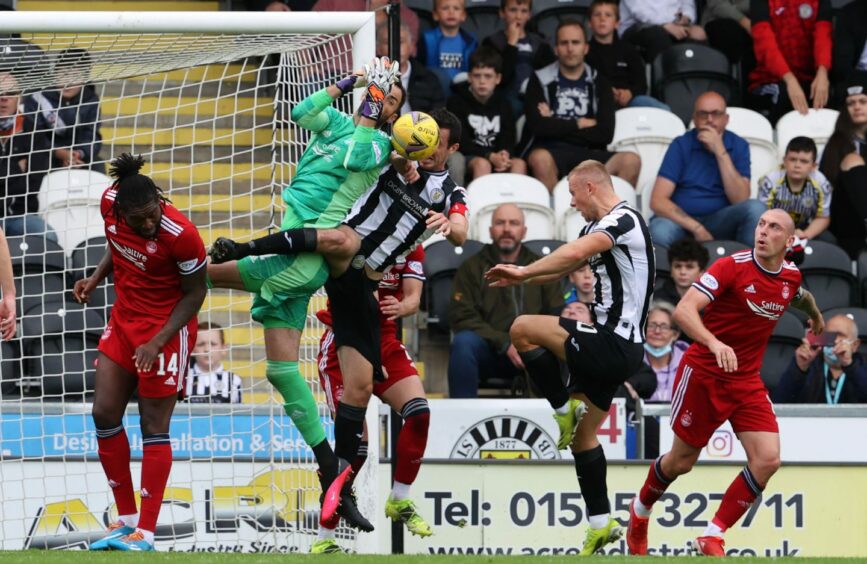After an opening to the Premiership campaign which could at best be described as underwhelming, Stephen Glass is facing up to what will be the most demanding task in his short managerial career.
Five league games without a win, with exits from Europe and the Premier Sports Cup thrown in, is hardly the run he would have hoped for ahead of what will be an incredibly tough month.
With three straight defeats behind them, the Dons kick off October against Celtic tomorrow, then after the international break they go to Dens and Ibrox and have home games against the high-flying Edinburgh sides.
If there is not a significant upturn in form, Aberdeen could be in a precarious position by the time November arrives.
They cannot complain about the fixture list. With the only encounters against top-six sides from last season being St Johnstone and Livingston, the Dons were handed an ideal opportunity to lay down the foundations for a successful campaign, but shambolic defending and wasteful finishing put paid to that, and now they must face the big guns.
If Stephen and his coaching staff are happy with their tactical approach and believe it is the way ahead, he will – as he threatened last week in Paisley – have to wield the axe, as too many of the players he has been selecting simply have not performed.
The manager has some huge decisions to make, and that may well include dropping club captain Joe Lewis.
The big man has been outstanding since arriving at Pittodrie, and is a magnificent ambassador off the pitch, but he has not looked the same this season, has lost some poor goals and is not making the saves he did in the past.
Joe has not been helped by the reshuffling of the central defence which has been populated in the last six weeks by players still settling into the club and getting used to the manager’s thinking, or in the case of Ross McCrorie, someone who is still very much learning the position.
The team is badly missing the steady consistency Andrew Considine has offered for years.
The Dons have kept just a single clean sheet in fourteen matches this season; in fact, that 2-0 win over Dundee United is the only time they have done so since Stephen took over in mid-April. Sorting that out has to be a priority.
The other main area of concern is up front where, despite netting twice last weekend, we simply aren’t scoring enough goals. Stephen has spoken of that being ‘easy to rectify’. He now needs to prove that.
Taken as a whole, the failure to keep out the opposition along with an inability to hurt them at the other end of the pitch is a toxic mix, and one which will have inevitable consequences for both the team and the manager if not addressed.
It is not a vintage Celtic they will be facing tomorrow. Since the loss to injury of Kyogo Furuhashi, Ange Postecoglou’s side has struggled as a raft of new players try to find their feet.
They sparkled earlier in the campaign with the Japanese in the team, and there is the clear danger they suddenly find that form again, although no-one has yet suggested they can fill the void.
Either way, it will certainly not be easy, and unless the Dons improve greatly, and step up to the mark, I’m afraid that depressing run might well continue for at least another week.
Could a decade of Ryder Cup dominance lie ahead for US?
It may not have ended the way we had hoped, but the Ryder Cup produced some of the best golf I have had the privilege to witness.
I watched every minute I could, and from early on, it became clear the old trophy would not be making the return trip across the Atlantic with Padraig Harrington and his team.
The American side was outstanding.
Dustin Johnson’s 100% record led the way, but Collin Morikawa, Patrick Cantlay and Xander Schauffele were not far behind, and even Bryson DeChambeau wasn’t as irritating as normal.
The European team is about to go into a period of transformation; a number of them have probably played in their last Ryder Cup.
If the US players maintain their form – and some are bound to drop away – they could dominate the event for the next decade.

